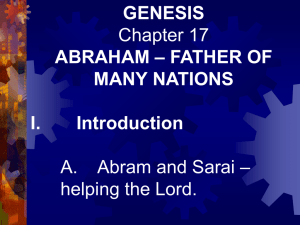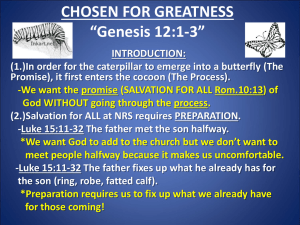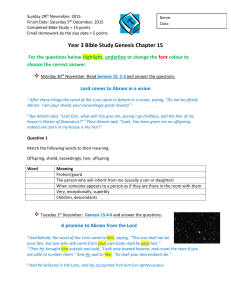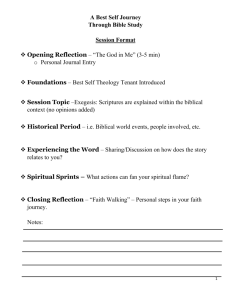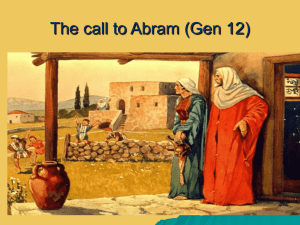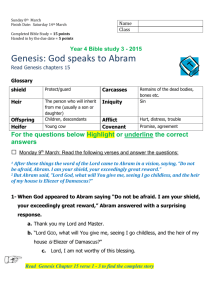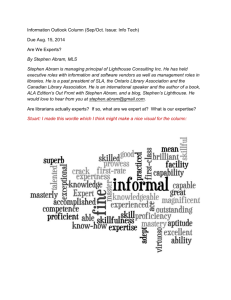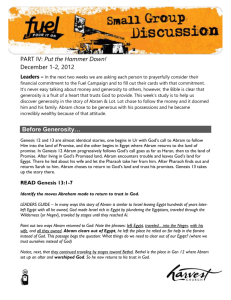Text - Christ Episcopal Church
advertisement
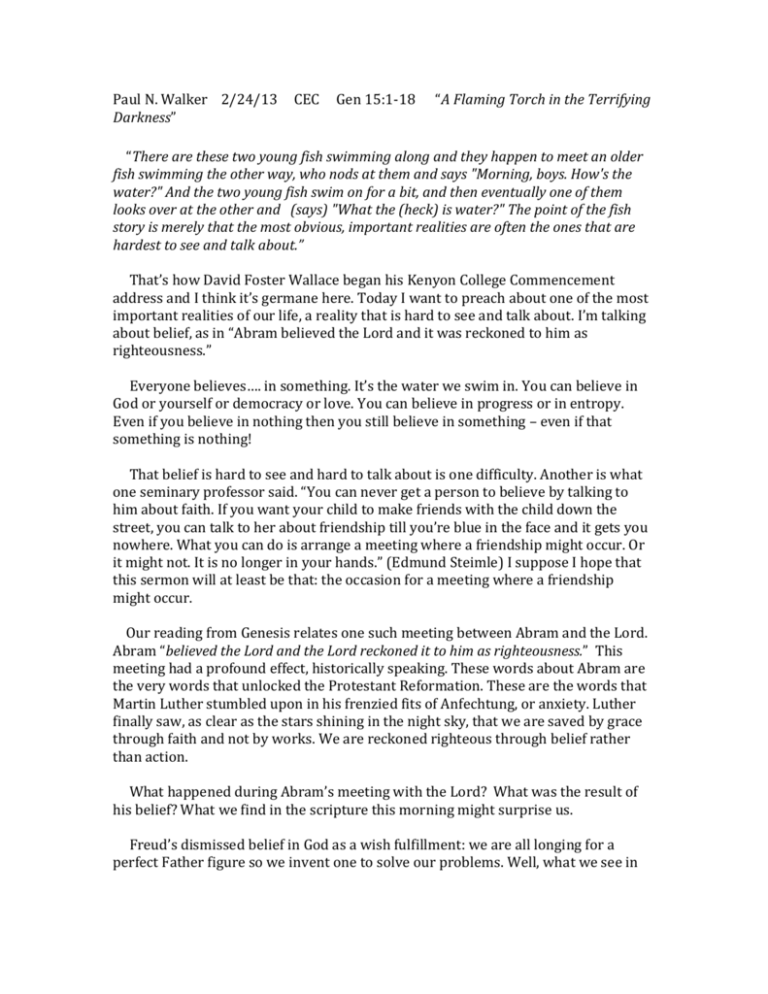
Paul N. Walker 2/24/13 Darkness” CEC Gen 15:1-18 “A Flaming Torch in the Terrifying “There are these two young fish swimming along and they happen to meet an older fish swimming the other way, who nods at them and says "Morning, boys. How's the water?" And the two young fish swim on for a bit, and then eventually one of them looks over at the other and (says) "What the (heck) is water?" The point of the fish story is merely that the most obvious, important realities are often the ones that are hardest to see and talk about.” That’s how David Foster Wallace began his Kenyon College Commencement address and I think it’s germane here. Today I want to preach about one of the most important realities of our life, a reality that is hard to see and talk about. I’m talking about belief, as in “Abram believed the Lord and it was reckoned to him as righteousness.” Everyone believes…. in something. It’s the water we swim in. You can believe in God or yourself or democracy or love. You can believe in progress or in entropy. Even if you believe in nothing then you still believe in something – even if that something is nothing! That belief is hard to see and hard to talk about is one difficulty. Another is what one seminary professor said. “You can never get a person to believe by talking to him about faith. If you want your child to make friends with the child down the street, you can talk to her about friendship till you’re blue in the face and it gets you nowhere. What you can do is arrange a meeting where a friendship might occur. Or it might not. It is no longer in your hands.” (Edmund Steimle) I suppose I hope that this sermon will at least be that: the occasion for a meeting where a friendship might occur. Our reading from Genesis relates one such meeting between Abram and the Lord. Abram “believed the Lord and the Lord reckoned it to him as righteousness.” This meeting had a profound effect, historically speaking. These words about Abram are the very words that unlocked the Protestant Reformation. These are the words that Martin Luther stumbled upon in his frenzied fits of Anfechtung, or anxiety. Luther finally saw, as clear as the stars shining in the night sky, that we are saved by grace through faith and not by works. We are reckoned righteous through belief rather than action. What happened during Abram’s meeting with the Lord? What was the result of his belief? What we find in the scripture this morning might surprise us. Freud’s dismissed belief in God as a wish fulfillment: we are all longing for a perfect Father figure so we invent one to solve our problems. Well, what we see in our text is that belief in God did not ameliorate Abram’s problems; it only intensified them. What about the meeting? First off there is fear. God says, “don’t be afraid” precisely because Abram is afraid. Next there is contradiction. God tells Abram that He will be His shield and reward, and Abram contradicts Him saying that he is childless and is forced to name a slave the heir of his estate. Then Abram turns the contradiction into accusation, blaming God for his impotency. Abram sounds like a teenager. None of this backtalk bothers God, however. He takes Abram outside to look at the stars and says that Abram’s descendents will outnumber them. And Abram believes. Abram’s belief is profound because what God promised was humanly impossible. Sarai was barren – the worst curse for a woman at that time. It also says that the “way of women had ceased to be with Sarah.” She and Abram were nearly a hundred years old. And remember, these were the days before Viagra! When God promised them a child, Sarai laughed a rueful laugh and said, “After I am worn out, and my husband is old, shall I have pleasure” – which is also translated as “Yeah, right”. So you see the outrageousness of Abram’s belief: it was truly against all odds and in face of physical impossibility. When God promised him an heir he didn’t say, “Praise the Lord and pass the Viagra”, he just believed the Lord and it was reckoned to him as righteousness. The same is true for you in whatever you are dealing with right now. A marriage that is impossible. A job that is impossible. A child that is impossible. A health issue that is impossible. In terms of biblical belief, it is the impossibility of the thing that is good! Otherwise, there is no need for belief. If you could do it yourself, you would just chart out your own solutions. As Kierkegaard said, “If I am capable of grasping God objectively I do not believe, but precisely because I cannot do this I must believe.” Here’s where the meeting between God and Abram gets more interesting. The minute Abram believes is the minute he doubts. Doesn’t that ring true? Abram questions God, wondering how he is to possess the land that God has promised to him. This leads to the bloody and grim work of a cultic covenant ceremony. Heifers and goats and rams, all cut in two. The animal carcasses attract vultures; Abram has to fight them off. Then we come to the place in the text where the real fun begins. “As the sun was going down, a deep sleep fell upon Abram, and a deep and terrifying darkness descended upon him.” One minute Abram believes and it is reckoned to him as righteousness; the next minute a deep and terrifying darkness engulfs him. That is the direct result of his belief. Christian Wiman (yes another plug) was diagnosed with incurable blood cancer several years ago. He speaks his belief in the face of this deep and terrifying darkness. “If God is a salve applied to unbearable psychic wounds, or a dream figure conjured out of memory and mortal terror, or an escape from a life that has become either too appalling or too banal to bear, then I have to admit: it is not working for me. Just when I think I’ve finally found some balance between active devotion and honest modern consciousness, all of my old anxieties come pressuring up through the seams of me, and I am as volatile and paralyzed as ever. What I do know is that the turn toward God has not lessened my anxieties, and I find myself continually falling back into wounds, wishes, terrors I thought I had risen beyond.” If religion is the opiate of the masses, as Marx suggested, then not many of us would choose this opiate. Deep and terrifying darkness I do not wish to experience; yet I have. If you have lived in this world and you have thought about your life in any kind of below the surface way, if you have suffered loss or fear or anxiety, then you have experienced deep and terrifying darkness. We do not need a belief that banishes the darkness; this is naïve and untenable in view of honest modern consciousness. Instead, like Abram, we need a belief that incorporates the darkness. We need a belief that allows us to see the terrifying darkness and not turn away. We need a belief that will sustain us in the darkness. When we are ripped apart, like the sacrificial animals, we need to meet a friend who will be with us in the darkness with enough light to light our way. “When the sun had gone down and it was dark, a smoking fire pot and a flaming torch passed between the pieces.” Sometimes in the darkness a smoking fire pot and a flaming torch are enough. When you are in despair about your child’s intransigence or your stale marriage, sometimes the littlest glimmer of movement will be enough to help. Sometimes a kind word from a mailman or a store clerk will be enough to penetrate the gloom you feel about the world. For me, it is the distant whistle of a train. When I hear a train on a faraway track, I see the smoking fire pot and the flaming torch. The scripture says that when Jesus Christ was crucified, there was darkness of the land from the 6th hour to the 9th. He is the sacrificial lamb prefigured by Abram’s meeting with God. He experienced the deep and terrifying darkness of death. And on the third day He emerged out into the light. When you are in your own doubt or accusation or darkness that is all bound up with belief, He is the Friend who will meet you with a flaming torch. He is the friend who will take you step by step into the light. He knows the way. He is the Way. He is also the Light. And, He’ll arrange the meeting. Amen.
